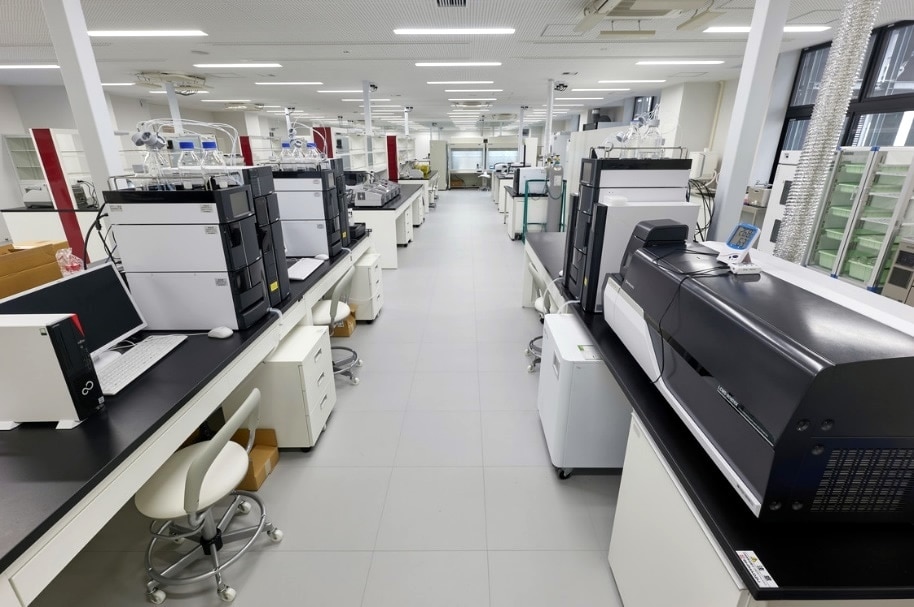January 6, 2022 | News & Notices
Using Biotechnology and Digital Technology to Further Contribute to Achieving a Carbon-Free Society
Investment in Kobe University Startup Company Bacchus Bio innovation Co., Ltd.
Shimadzu Corporation invested in Bacchus Bio innovation Co., Ltd. (hereinafter “Bacchus”), a startup company spun off from Kobe University, and signed a corresponding business partnership agreement. Bacchus’s strength is using its advanced biotechnology in combination with digital technology in the field of “smart cells.” By investing in Bacchus, Shimadzu intends to fully enter the field of smart cells and contribute to achieving a carbon-free society through development of innovative analytical and measuring technologies.
Smart cells are cells with artificially modified genes that allow for efficiently mass producing targeted beneficial substances. Combining biotechnology, such as genome editing or genome synthesis, with digital technology, such as AI or IT, is expected to improve production efficiency for substances that were previously difficult to mass produce using conventional methods. Therefore, it will result in technical innovation in various areas, such as pharmaceuticals, foods, new materials, and environmental measurement. Smart cells are also considered essential from the perspective of a carbon-free society. In other words, smart cells will help us stop using fossil fuels by transitioning from manufacturing based on petroleum or natural gas to manufacturing based on biotechnology. Furthermore, if conventional production methods that consume large quantities of energy can be replaced with biotechnology-based methods, it would result in lower carbon dioxide emission levels and enable a carbon-free society.
Nevertheless, adopting biotechnological production methods in industry presents various challenges, such as the ability to quickly and accurately confirm whether intended substances were actually produced and the ability to scale up production of new substances created in a laboratory and mass produce them at high quality levels. Meanwhile, only a few large companies in the United States are involved in smart cell development or in the business of offering systems for producing targeted substances (biofoundries). Concerns that such companies will charge expensive outsourcing fees or require signing complicated agreements, for example, have made it difficult for Japanese companies to freely use new materials produced by smart cells.
Shimadzu has been contributing to the field of smart cells with the analytical and measuring technologies based on liquid chromatographs (LC) and mass spectrometers (MS). For five years since 2016, Shimadzu has been engaged in joint research with Kobe University for a project of Japan’s New Energy and Industrial Technology Development Organization (NEDO), where we have achieved shorter pretreatment times, higher analytical accuracy, and other improvements for analyzing metabolites from cells.
Bacchus is a startup company spun off from Kobe University. They are engaged in offering a contract development service for creating smart cells tailored to customer needs based on technologies cultivated in NEDO projects and other applications by Prof. Akihiko Kondo, Vice-President of Kobe University and Dean of the Graduate School of Science, Technology and Innovation (Director of Bacchus) and Prof. Tomohisa Hasunuma, Director of the Engineering Biology Research Center at Kobe University (Bacchus technical advisor). They have provided highly original advanced technologies in collaboration with Bio Palette Co., Ltd. and Synplogen Co., Ltd., which were also Kobe University startup companies, involved in genome editing and DNA synthesizing, respectively.
Based on a partnership agreement, in January 2022 Shimadzu will start joint research with Bacchus on multiple topics, such as developing instrument improvements for achieving higher throughput. We will also station one employee at Bacchus for solving various issues in the field of smart cells. Shimadzu’s intention is to partner with Bacchus to establish Japan’s first biofoundry for serving the biotechnology-related market that is predicted to be worth 300 trillion yen by 2030. The joint research will also allow us to identify advanced needs in the smart cell field, so we can reflect them in the product development process as early as possible, thus solving challenges in society.

Row of Shimadzu Liquid Chromatograph Mass Spectrometer Systems at the Bacchus Laboratory
Overview of Company Receiving Shimadzu Investment
| Company Name | : | Bacchus Bio innovation Co., Ltd. |
| Location of Head Office | : | Nada Ward of Kobe City |
| Representative | : | Mikio Tanji, President and CEO |
| Established | : | March 2020 |
| Business Scope | : | Integrated biofoundry |
| Primary Investor | : | DEFTA Limited (Hong Kong, Director: George Hara), DEFTA Healthcare Technologies, L.P. (Cayman Islands), ROHTO Pharmaceutical Co., Ltd. (Osaka City, Osaka Prefecture, President: Masashi Sugimoto), Taiyo Oil Co., Ltd. (Chiyoda City, Tokyo Prefecture, President: Yutaka Oka), and Sojitz Corporation (Chiyoda City, Tokyo Prefecture, President: Masayoshi Fujimoto) |
| Website | : | https://www.b2i.co.jp/ |
Biofoundry
Biofoundries are systems for efficiently mass producing targeted beneficial substances using cells with modified genes (smart cells) developed based on biotechnology, such as for editing the genomes of microorganisms or plant/animal cells, and AI technology.
Design: First, AI is used to design metabolic pathways and genes that can efficiently produce targeted substances. Build: Next, genome editing or other biotechnology is used to manipulate genes for producing corresponding microorganisms or plants according to the design. Test: Then, the substances produced by those microorganisms or plants are tested to evaluate whether they are produced with the intended quality and quantity. Learn: Lastly, AI is used again to analyze the results and learn about the substance production patterns. The information learned is then applied to designing new genes. That development cycle is referred to as “DBTL,” the acronym for each step. Biofoundries rationally and efficiently develop new substances by repeating that DBTL development cycle very rapidly.


